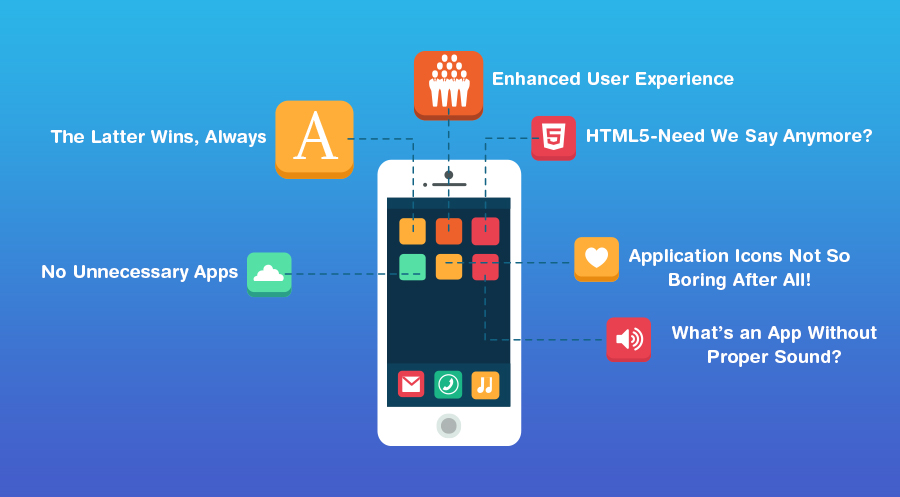Why Choose iOS to Develop Mobile Applications?
Mobile being the technology that is popular beyond all measure, mobile apps hold much of the trigger behind the success. And so, any buzz around mobile app development never comes as a surprise - especially the question regarding what platform to choose to work upon.  This question usually means listing the pros and cons of both iOS and Android operating system, and then levelling those pros and cons against the needs of the application, which finally leads to making the choice. But, judging the two operating systems can be a tough job for the developers. We think that iOS has many advantages over its counterpart. But, we wouldn't want to say that without giving you proper reasoning behind that judgement. So, to cut through the cut-throat competition between these two and to enable the developers to take a relatively quicker, while the right decision, we have come up with a list of our own that reasons out why iOS would almost always be better choice to build your mobile application on:
This question usually means listing the pros and cons of both iOS and Android operating system, and then levelling those pros and cons against the needs of the application, which finally leads to making the choice. But, judging the two operating systems can be a tough job for the developers. We think that iOS has many advantages over its counterpart. But, we wouldn't want to say that without giving you proper reasoning behind that judgement. So, to cut through the cut-throat competition between these two and to enable the developers to take a relatively quicker, while the right decision, we have come up with a list of our own that reasons out why iOS would almost always be better choice to build your mobile application on:
Quantity v/s Quality: The Latter Wins, Always. If it’s a quantity vs quality duel, it’s quality that would win majority of the times. And it says a lot about this platform, when we say that it’s the quite the same battle that plays out between Android and iOS - and iOS wins just about every time, given its better quality. If we take into account the number of apps having been developed on Android platform, it would win hands down, but the bigger number itself holds no bearing whatsoever on the unmatched media quality that you see in mobile games and applications built on iOS.
No Unnecessary Apps Unlike Android, iOS does not allow the smartphones to be overloaded with third party applications, most of which come at a cost that doesn’t justify the quality they showcase. You will even find many of the pre-installed apps in Android that won’t be up to the mark, and it’d be very easy to feel plain cheated. This is where Apple goes a step ahead in not just working on creating quality, but also working on maintaining it. Buy not allowing any other carrier data, it cuts off on many unnecessary applications, providing a big advantage to the end users.
Enhanced User Experience What is Apple known for, if not for its unique end user experience? One of teh major problems that one faces with an Android phone, is fragmentation. With so many manufacturers and carriers associated with handsets using Android OS, you have so many users who don’t get to use the latest version of the operating system - that is less than 10% of the total Android users are well acquainted with the newest version. This, one won’t find with iOS, with more than half the end users using the latest version of the operating system. Apple, one finds, does not allow skinning, and by making sure that its users are able to upgrade to new versions, helps in resulting a better user experience.
HTML5 - Need We Say Anymore? Isn’t HTML5 already a big thing out there on the Internet? And don’t we already know that it has got more than enough potential to be a successor to the multimedia giant Flash? Add to this a better support system, and you’ll certainly see the growth graph showing the usage of Apple devices soaring up.
Application Icons - Not So Boring After All! Another area where Android OS would feel a bit left over is when it comes to the beautifully designed icons that you find in Apple. So appealing in both aesthetic as well as functionality point of view, iOS icons make Android ones look quite humdrum and mundane in comparison.
What’s an App Without Proper Sound? The sound part of an application plays a great role in making it a hit amongst its users - and Apple makes sure that its handsets play a role in making the audio part better than its counterparts. iOS devices, very unlike their Android cousins, can host, that is play as well as record audio with the standard Apple USB devices. Smartphone users obviously lay a lot of emphasis on the audio features, and music on iOS devices sounds hands-down better than on an Android device. As you develop your idea into a viable mobile application, you’ll see that from every angle - be it the functionality, the way it looks aesthetically, as well as from the business point of view - iOS will come off as the easiest and the most natural choice for a platform to work on. A mobile application is only as good as it is of value to the audience that it wants to cater to. And so, a key factor in making an application, and consequently the brand popular, is how businesses adapt their applications for their respective markets, keeping in mind the minds of the end users.
 This question usually means listing the pros and cons of both iOS and Android operating system, and then levelling those pros and cons against the needs of the application, which finally leads to making the choice. But, judging the two operating systems can be a tough job for the developers. We think that iOS has many advantages over its counterpart. But, we wouldn't want to say that without giving you proper reasoning behind that judgement. So, to cut through the cut-throat competition between these two and to enable the developers to take a relatively quicker, while the right decision, we have come up with a list of our own that reasons out why iOS would almost always be better choice to build your mobile application on:
This question usually means listing the pros and cons of both iOS and Android operating system, and then levelling those pros and cons against the needs of the application, which finally leads to making the choice. But, judging the two operating systems can be a tough job for the developers. We think that iOS has many advantages over its counterpart. But, we wouldn't want to say that without giving you proper reasoning behind that judgement. So, to cut through the cut-throat competition between these two and to enable the developers to take a relatively quicker, while the right decision, we have come up with a list of our own that reasons out why iOS would almost always be better choice to build your mobile application on: Quantity v/s Quality: The Latter Wins, Always. If it’s a quantity vs quality duel, it’s quality that would win majority of the times. And it says a lot about this platform, when we say that it’s the quite the same battle that plays out between Android and iOS - and iOS wins just about every time, given its better quality. If we take into account the number of apps having been developed on Android platform, it would win hands down, but the bigger number itself holds no bearing whatsoever on the unmatched media quality that you see in mobile games and applications built on iOS.
No Unnecessary Apps Unlike Android, iOS does not allow the smartphones to be overloaded with third party applications, most of which come at a cost that doesn’t justify the quality they showcase. You will even find many of the pre-installed apps in Android that won’t be up to the mark, and it’d be very easy to feel plain cheated. This is where Apple goes a step ahead in not just working on creating quality, but also working on maintaining it. Buy not allowing any other carrier data, it cuts off on many unnecessary applications, providing a big advantage to the end users.
Enhanced User Experience What is Apple known for, if not for its unique end user experience? One of teh major problems that one faces with an Android phone, is fragmentation. With so many manufacturers and carriers associated with handsets using Android OS, you have so many users who don’t get to use the latest version of the operating system - that is less than 10% of the total Android users are well acquainted with the newest version. This, one won’t find with iOS, with more than half the end users using the latest version of the operating system. Apple, one finds, does not allow skinning, and by making sure that its users are able to upgrade to new versions, helps in resulting a better user experience.
HTML5 - Need We Say Anymore? Isn’t HTML5 already a big thing out there on the Internet? And don’t we already know that it has got more than enough potential to be a successor to the multimedia giant Flash? Add to this a better support system, and you’ll certainly see the growth graph showing the usage of Apple devices soaring up.
Application Icons - Not So Boring After All! Another area where Android OS would feel a bit left over is when it comes to the beautifully designed icons that you find in Apple. So appealing in both aesthetic as well as functionality point of view, iOS icons make Android ones look quite humdrum and mundane in comparison.
What’s an App Without Proper Sound? The sound part of an application plays a great role in making it a hit amongst its users - and Apple makes sure that its handsets play a role in making the audio part better than its counterparts. iOS devices, very unlike their Android cousins, can host, that is play as well as record audio with the standard Apple USB devices. Smartphone users obviously lay a lot of emphasis on the audio features, and music on iOS devices sounds hands-down better than on an Android device. As you develop your idea into a viable mobile application, you’ll see that from every angle - be it the functionality, the way it looks aesthetically, as well as from the business point of view - iOS will come off as the easiest and the most natural choice for a platform to work on. A mobile application is only as good as it is of value to the audience that it wants to cater to. And so, a key factor in making an application, and consequently the brand popular, is how businesses adapt their applications for their respective markets, keeping in mind the minds of the end users.
Pritesh


Pritesh Pethani
